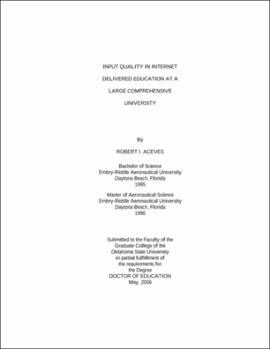| dc.contributor.advisor | Harris, Ed | |
| dc.contributor.author | Aceves, Robert I. | |
| dc.date.accessioned | 2013-11-26T08:34:06Z | |
| dc.date.available | 2013-11-26T08:34:06Z | |
| dc.date.issued | 2006-05 | |
| dc.identifier.uri | https://hdl.handle.net/11244/7290 | |
| dc.description.abstract | Scope and method of Study: A case study conducted at a large accredited comprehensive university in its developmental stages of Internet-delivered education supports the research that higher education organizations should not just alter how they perform their traditional tasks, but question whether these tasks and their missions are in line with the newly emerging environment. This study constituted a large-scale replication of Hensrud's (2001) study, this study closes gaps in the research literature using Moore's (1987) theories of transactional distance education and applying Moore's and Kearsley's (1996) systems theory framework to this specific online program, the case study evaluated the Internet-delivered education program both conceptually and holistically. Utilizing Hensrud's (2001) survey instrument, validated through extensive review of the accreditation and best practices literature, the seven component parts of the program were identified as institutional support, course development, teaching and learning, course structure, student support, faculty support, and evaluation and assessment. Subjects: administrators, instructional academic staff, faculty, and support staff. Population: 130 with a 67% (N = 87) response rate. Descriptive parameters: measures of central tendency (mean and median), dispersion (standard deviation and variance), and distribution (skewness and kurtosis). Respondents: 47 males and 40 females, 2 respondents ages 20-30, 21 ages 31-40, 30 ages 41-50, 27 ages 51-60 and 7 over 61 years old. Online teaching experience: 18 had 1-2 years experience, 25 had 3-5 years, and 32 had 5+ years. | |
| dc.description.abstract | Findings: The program met the quality criteria in two of the seven categories: institutional support and teaching/learning process. Quality criteria not met: course development, course structure, student support, faculty support, and evaluation and assessment. | |
| dc.description.abstract | Recommendations: Additional focus on hybrid curriculums, the life cycle of Internet delivered education programs to determine if quality criteria are being met on a system-wide level. | |
| dc.format | application/pdf | |
| dc.language | en_US | |
| dc.rights | Copyright is held by the author who has granted the Oklahoma State University Library the non-exclusive right to share this material in its institutional repository. Contact Digital Library Services at lib-dls@okstate.edu or 405-744-9161 for the permission policy on the use, reproduction or distribution of this material. | |
| dc.title | Input quality in Internet delivered education at a large comprehensive university | |
| dc.contributor.committeeMember | Stern, Kenneth | |
| dc.contributor.committeeMember | Forsyth, Patrick | |
| dc.contributor.committeeMember | Steinbrink, John E. | |
| osu.filename | Aceves_okstate_0664D_1789.pdf | |
| osu.accesstype | Open Access | |
| dc.type.genre | Dissertation | |
| dc.type.material | Text | |
| thesis.degree.discipline | School Administration | |
| thesis.degree.grantor | Oklahoma State University | |
